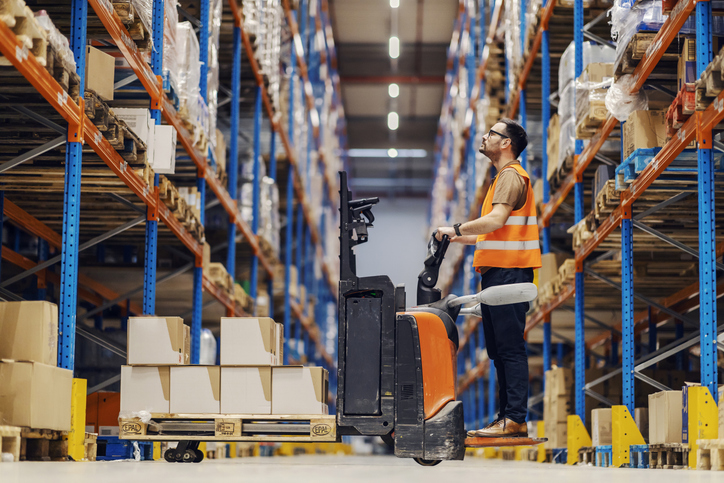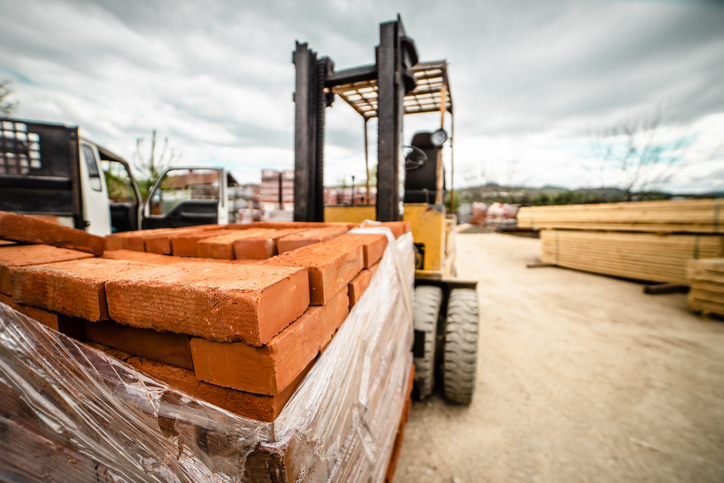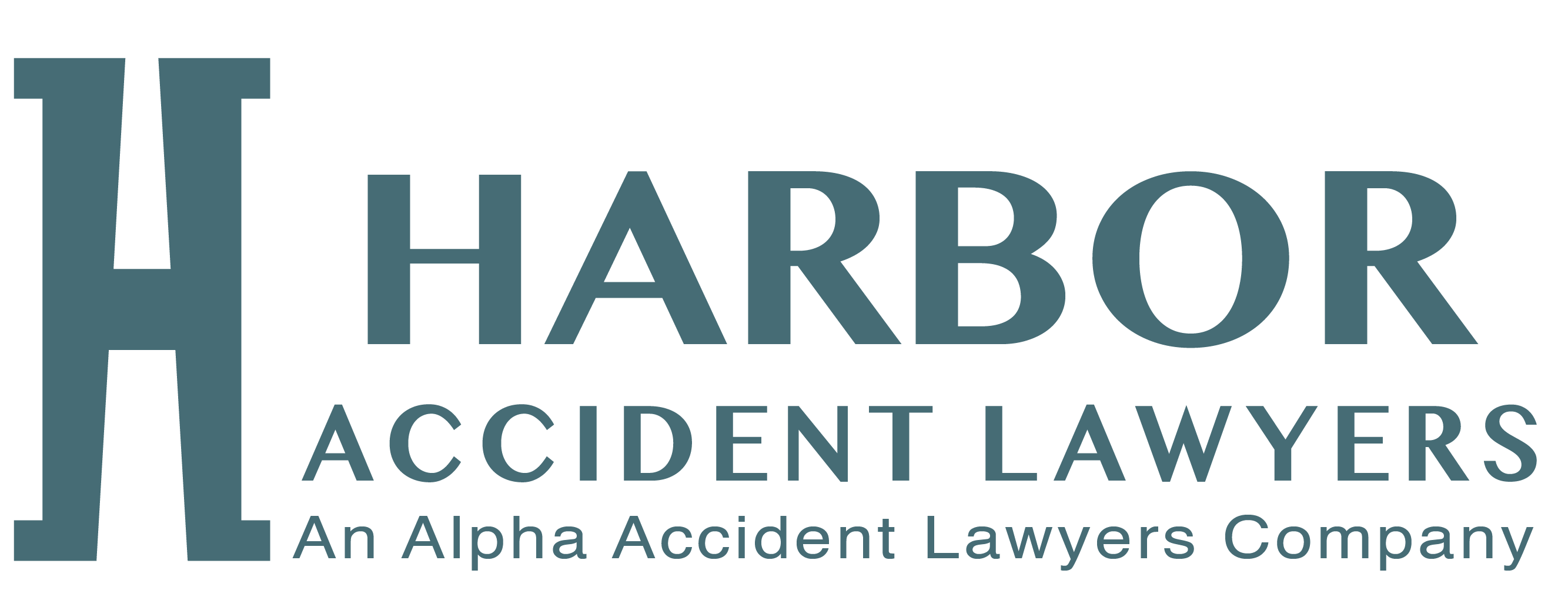
What is a Lift Truck Accident?
Lift trucks, commonly known as forklifts, are indispensable tools in various industries, but their operation comes with inherent risks. Understanding the most common types of lift truck accidents is crucial for workplace safety and injury prevention. Read on to learn what is the most common type of lift truck accident, common forklift accident injuries, and how to prevent these kinds of accidents.
The Most Common Lift Truck Accidents
Pedestrian Impacts
According to data from the U.S. Department of Labor’s Bureau of Labor Statistics, pedestrian impacts are the number 1 cause of lift truck-related work fatalities. Despite efforts to separate pedestrian and forklift traffic, accidents can still occur due to factors such as blind spots, distractions, or insufficient training.
Pedestrians struck by forklifts may suffer from severe injuries, ranging from broken bones to traumatic brain injuries. Implementing robust safety measures, such as designated walkways, barriers, and high-visibility clothing, can help minimize the risk of pedestrian impacts and promote a safer work environment.
Forklift Rollovers
Forklift rollovers are another leading cause of lift truck accidents, representing 42% of all forklift-related deaths. Such accidents often occur when a vehicle overturns or tips over, often due to excessive speed, sharp turns, or driving on uneven surfaces.
When a forklift tips over, it poses a severe risk to the operator and nearby workers, potentially causing crush injuries, fractures, or even death. Studies show that proper operator training, retraining, and forklift operation procedures could reduce accidents by 70%.
Crushed By a Forklift
Accidents involving individuals being crushed by a forklift are unfortunately common. These accidents typically result from distracted driving, fatigue, improper use of the forklift’s controls, or pedestrians being in areas they shouldn’t be.
The weight and force exerted by a forklift can lead to catastrophic injuries, including internal organ damage, spinal injuries, or traumatic amputations. Strict adherence to safety protocols, including establishing clear pedestrian zones and providing visible warning signs, is crucial for preventing these tragic accidents.
Falling Loads
Improperly secured or stacked loads present a hazard to forklift operators and anyone working in the vicinity. When loads fall from a forklift, they can cause serious injuries, damage property, or even trigger secondary accidents.
Factors contributing to falling loads include inadequate securing techniques, overloading, or sudden movements of the forklift. Employers must prioritize proper training for operators on load handling procedures, including inspecting loads for stability and using appropriate securing methods to prevent falling loads and maintain workplace safety.
Truck Falling Off a Dock or Trailer
Loading and unloading materials onto docks or trailers pose inherent risks, particularly when forklifts are involved. Accidents where a forklift falls off a dock or trailer can result from operator error, mechanical failure, or inadequate safety measures.
These incidents often lead to severe injuries or fatalities, highlighting the importance of implementing robust safety protocols, such as chocking wheels, using dock restraints, and providing proper training for dock operations. Regular inspections of loading equipment and adherence to industry standards can help prevent these devastating accidents.
Personnel Falling from Forks
Inexperienced individuals sometimes attempt to ride on the forks of a forklift, leading to falls and severe injuries. Proper safety protocols must be enforced to prevent such incidents.
Truck Falling to Lower Levels
Operating forklifts near edges or elevated platforms can result in the vehicle falling to lower levels, endangering the operator and those below.
Mechanical Failures
Equipment malfunctions, such as brake failures or steering issues, can contribute to lift truck accidents. Regular maintenance and inspections are essential for preventing mechanical failures.
Common Causes of Forklift Accidents

In construction, forklift accounts for 25 percent of all accidents. Workplaces, where powered industrial trucks are used, present a variety of different hazards. Many accidents have occurred because of unsafe truck operations. Here are common causes of forklift accidents:
Turning Too Quickly: One of the leading causes of forklift accidents is operators turning too quickly, especially when carrying heavy loads. Abrupt turns can destabilize the vehicle, leading to rollovers or loss of control.
Elevated Load: Attempting to lift loads beyond the recommended height can compromise the forklift’s stability, increasing the risk of tip-overs or load spills.
Imbalanced or Overweight Loads: Failure to properly balance or exceed the forklift’s load capacity can result in load shifts or tip-overs, endangering both the operator and nearby workers.
Speeding: Operating a forklift at excessive speeds reduces the operator’s ability to react to obstacles or changes in the environment, increasing the likelihood of collisions or accidents.
Poor Visibility: Limited visibility, either due to blind spots or obstructed views, hampers the operator’s awareness of their surroundings, making it difficult to avoid hazards or pedestrians.
Overworked operators: Fatigue can impair an operator’s judgment and reaction times, increasing the risk of accidents and injuries. Adequate rest periods and shift scheduling are essential for maintaining operator alertness and safety.
Operating the Vehicle Under the Influence: Operating a forklift while under the influence of drugs or alcohol significantly impairs judgment, coordination, and reaction times, posing a serious risk to workplace safety.
Inadequate Operator Training: Insufficient training on forklift operation and safety procedures contributes to errors, misuse of equipment, and preventable accidents. Employers must provide comprehensive training programs and regular refresher courses to ensure operator competence and compliance with safety standards.
Implementing comprehensive training programs, enforcing safety protocols, and conducting regular inspections can significantly reduce the occurrence of forklift accidents in the workplace.
How to Prevent Forklift Accidents
Here are tips to avoid common forklift accidents:
- Proper Training: Employers should provide thorough training programs for forklift operators, covering safe operation, load handling, and emergency procedures. Training should be tailored to the specific type of forklift and workplace conditions.
- Regular Maintenance: Scheduled inspections and maintenance checks should be conducted on all forklifts to identify and address potential mechanical issues before they lead to accidents. Operators should also be encouraged to report any signs of equipment malfunction promptly.
- Implementing Safety Measures: Implement safety protocols, such as wearing seat belts, using horn signals, and maintaining clear pathways for forklift traffic. Employers should also provide personal protective equipment (PPE), such as helmets and high-visibility clothing, for both operators and pedestrians.
- Prevent Falling Loads: Properly secure and balance loads according to manufacturer guidelines to prevent shifting or falling during transport. Avoid carrying loose or damaged merchandise. Ensure that the load is centered. Operators should be trained to inspect loads for stability and integrity before lifting or moving them.
- Traffic Management: Establish designated forklift routes and pedestrian walkways, with clear signage and markings to indicate right-of-way and safe crossing points. Separating forklift and pedestrian traffic reduces the risk of collisions and improves overall workplace safety. Installing barriers and floor tape to separate forklift traffic from pedestrian walkways. Also, installing wall-mounted mirrors on the premises (especially on blind spots) and adding warning lights and travel alarms.
- Supervision: Assign trained supervisors to oversee forklift operations and enforce safety guidelines consistently. Supervisors should monitor operators’ compliance with safety protocols and provide corrective feedback as needed to maintain a safe working environment.
Common Forklift Accident Injuries
According to the Occupational Safety and Health Administration (OSHA), about 35,000 serious injuries and 62,000 non-serious injuries involving forklifts occur each year. Forklift accidents can result in the following injuries:
- Crush Injuries – Being caught between a forklift and another object can lead to crush injuries, causing severe damage to bones, tissues, and internal organs. These injuries often require immediate medical attention and may result in long-term disability or impairment.
- Fractures – The impact of a forklift collision or fall can cause fractures to bones in the arms, legs, spine, or pelvis. Fractures may vary in severity, from hairline fractures to compound fractures requiring surgical intervention and extensive rehabilitation.
- Traumatic Brain Injuries (TBIs) – Head injuries sustained in forklift accidents, such as concussions or skull fractures, can result in traumatic brain injuries with long-term cognitive, physical, and emotional consequences. TBIs may require specialized medical care and ongoing rehabilitation to manage symptoms and improve outcomes.
- Soft Tissue Injuries – Sudden movements or impacts during forklift accidents can cause strains, sprains, or tears to muscles, ligaments, and tendons. Soft tissue injuries may result in pain, swelling, and reduced range of motion, requiring rest, physical therapy, and supportive measures for recovery.
In severe cases, forklift accident injuries can lead to permanent disability, chronic pain, or loss of function, impacting the individual’s ability to work and perform daily activities. Prompt medical evaluation and treatment are essential for maximizing recovery and minimizing long-term complications.
Who is Liable in a Forklift Accident?

Workplace accident injuries
Injuries sustained in forklift accidents are considered workplace accidents, entitling victims to workers’ compensation benefits to cover medical expenses, lost wages, and rehabilitation costs.
Premises liability
In cases where negligence contributed to the forklift accident, premises liability laws may hold property owners or managers accountable for failing to maintain a safe environment.
Determining liability in a forklift accident depends on various factors, including the actions of:
The Forklift Operator
Operators who engage in reckless or negligent behavior, such as speeding, ignoring safety protocols, or operating under the influence, may bear liability for accidents resulting from their actions.
The Employer
Employers have a duty to provide a safe work environment, including proper training, maintenance of equipment, and enforcement of safety policies. Failure to fulfill these obligations may result in liability for accidents caused by inadequate training, supervision, or workplace conditions.
The Landowner or Property Manager
Those responsible for the premises where the forklift accident occurred may be held liable for injuries resulting from hazardous conditions, inadequate signage, or failure to address known safety risks.
Other Third Parties
In cases involving defective equipment or products, manufacturers, distributors, or suppliers of forklifts or related components may be liable for accidents caused by design flaws, manufacturing defects, or failure to warn of known hazards.
An experienced personal injury attorney can help victims identify the responsible parties and hold them accountable for their actions.
Available Damages in a Workers’ Compensation Claim
In a workers’ compensation claim following a forklift accident, injured workers may seek various types of damages, including:
- Medical Expenses: Coverage for medical treatment, surgeries, medications, and rehabilitation services related to the injuries sustained.
- Lost Wages: Compensation for income lost due to temporary or permanent disability resulting from the accident.
- Disability Benefits: Financial support for partial or total disability resulting from the forklift accident.
- Vocational Rehabilitation: Assistance with retraining or job placement services for individuals unable to return to their previous roles.
Navigating the workers’ compensation process can be complex, requiring the guidance of experienced attorneys specializing in workplace injury claims.
Contact Experienced California Workers’ Compensation Attorneys
If you’ve been injured in a forklift accident in California, it’s important to seek medical attention immediately and consult with an experienced workers’ compensation attorney who will protect your rights and best interests.
At Harbor Accident Lawyers, our personal injury attorneys are dedicated to helping injured victims pursue fair compensation for their injuries and losses. We maintain a 99% success rate and have recovered millions of dollars in compensation for our clients. Call our San Diego personal injury law firm today to schedule a free case review.
